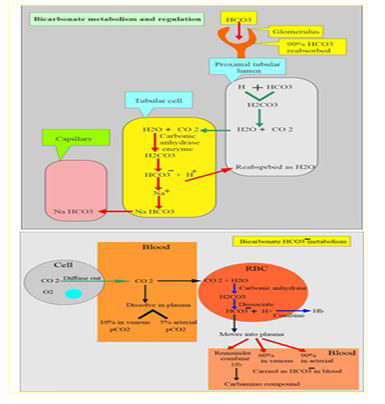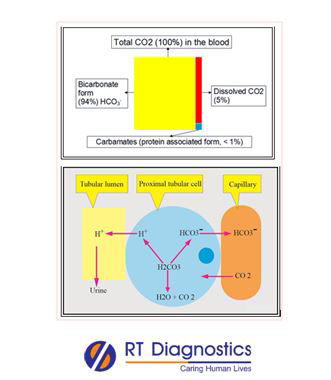Bicarbonate (Total CO2):
Why Bicarbonate – Total CO2 test?
CLINICAL INFORMATION :
Bicarbonate – Total CO2 test is performed with any disease or condition that affects lungs (bronchitis, emphysema), kidneys, metabolic disorder or breathing (COPD – chronic obstructive pulmonary diseases), and/or SARS (severe acute respiratory syndrome e.gcorona virus disease COVID-19). This test result reflects the acid-base balance (acidity or alkalinity), hence any imbalance between the oxygen and carbon-di-oxide in the blood can cause a direct effect on pH imbalance. Levels of carbon-di-oxide levels can be checked in the body by blood gas - PCO2 (partial pressure) / ABG – Arterial Blood Gas and levels of bicarbonate levels by measuring electrolyte. Bicarbonate (90% of the carbon-di-oxide exists as bicarbonate – HCO3) and also some percent of carbon-di-oxide exists as carbonic acid – H2CO3. Hence when bicarbonate gets dissociated it liberates carbon-di-oxide (gaseous end-product of metabolism) and hence CO2 test is a part of an electrolyte or basic metabolic panel. Usually when the kidneys or lungs are affected CO2 levels and hence the altered levels of CO2 indicate either dehydration or fluid accumulation in the body hence can cause an imbalance in electrolytes. A rare genetic condition where the liver fails to produce enough alpha-1 – antitrypsin (AAT) can cause hypercapnia. Hypercapnia or hypercarbia or carbon-di-oxide retention is of excess carbon-di-oxide build-up by the body can cause headaches, dizziness, fatigue, light-headedness, muscle twitching, nausea, vomiting, numbness in hands and legs, tetany (prolonged muscle spasm), excessive fatigue, feeling disoriented, shortness of breath and serious complications such as confusion, depression or paranoia, hyper-ventilation, arrhythmias (irregular heart-0beats), seizures, panic attacks or loss of consciousness and/or COMA. Another cause hypercapnia is amyotrophic lateral sclerosis (ALS), encephalitis, Gullian-Barre syndrome, Myasthenia gravis, cystic fibrosis (pulmonary fibrosis), deep-sea diving, high altitude trekking, smokers, asthma, exposure to toxic chemicals (lung irritants), patients with COPD, prolonged use of ventilators, brain stem stroke, hypothermia, obesity, an overdose of certain drugs like opioids, benzodiazepine and/or alcohol with drug abuse such as benzodiazepines, etc. On the contrary lower levels of carbon-di-oxide can occur in cases such as kidney failure, severe diarrhea, chronic vomiting, lactic acidosis, pulmonary hypertension, seizures, cancers, severe obesity, prolonged lack of oxygen due to severe anemia, heart failure or shock, hypo-ventilation, certain medications, diabetic acidosis (diabetic ketoacidosis), pulmonary embolism, heart diseases and/or congenital heart defects, oxygen therapy, surgery, low potassium levels, and lifestyle changes, etc. Clinical signs and symptoms are cyanosis – blue discoloration of nail beds, skin, and mucus membrane. Complications of neglected cyanosis is a life-threatening condition that can lead to respiratory failure, COMA, and death. Other tests include Arterial blood gas, spirometer test, pulse-oxymetry, X-Ray or CT-Scan, etc.


General instructions:
Sample Requirement: Specimen - Blood sample collected from the vein. Test Preparation: None.
NOTE - Sample for specimen collections may vary based on the patient’s condition/cases according to the patient’s presenting complaints/signs or symptoms:
SPECIMEN REQUIREMENT (Special or Rare Cases) - As instructed and guided by Physician / Clinician / Pathologist / as per Laboratory’s requirements, according to procedures and protocols.
This Multi-Specialty Clinical Referral Laboratory RTDIAGNOSTICS provides precise and accurate tests with an extensive range of testing services to the medical centers to help in the diagnosis and identification of pathology in the test specimens for infectious diseases and also to evaluate the function of organ systems of the patient. It prevents further complications and helps to stabilize and restore health to near normalcy at the earliest without delay.



